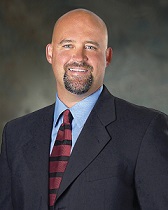 Joseph Burkhardt, DO, an orthopedic surgeon with Great Lakes Bone and Joint Center and Meridian Surgical Partners' Brookside Surgery Center in Battle Creek, Mich., answers questions about his experience with outpatient knee surgery and the benefits of customized implants.
Joseph Burkhardt, DO, an orthopedic surgeon with Great Lakes Bone and Joint Center and Meridian Surgical Partners' Brookside Surgery Center in Battle Creek, Mich., answers questions about his experience with outpatient knee surgery and the benefits of customized implants. Question: Why do you believe knee surgery is a good fit for the ambulatory surgery center setting?
Dr. Joseph Burkhardt: From a cost standpoint, it is more effective. Ambulatory surgery centers can provide that care at a much more competitive rate than hospitals. From the patient perspective, these elective procedures can be performed in an environment with a lower infection risk and they can get back to their normal lives at a faster rate.
Q: How long have you been performing outpatient knee surgery?
JB: I have been performing outpatient knee surgery for nearly 15 years. Since I first began it has evolved. Initially I was noticing patients in the hospital were being asked to be discharged a lot sooner than we typically would do so. We the set up a program at the ASC and began discharging patients late in the day. We noticed the same thing; patients were asking for earlier discharge.
I think this shift occurred because we began to move to techniques that resulted in less post-operative pain. We moved away from general anesthesia to regional nerve blocks. If you look back at orthopedic surgery, historically ACL reconstruction, rotator cuff surgery and partial knee surgery all used to be inpatient procedures. This has changed dramatically in recent times.
Q: What are some important considerations for surgeons preparing to bring knee surgery to the outpatient setting?
JB: Payers aren't always supportive of this move, but this has begun to change as the benefits become more apparent. Another important step is setting patient expectations. Patients need to understand their own ability to handle post operative pain. Those patients that have a poor pain tolerance are the wrong person for the outpatient setting.
Patient selection is also important. Outpatient surgery candidates tend to be physically fit and healthy aside from the joint issue.
Q: Why do you think customized implants are a good addition to the outpatient surgeon's repertoire?
JB: Customized knee implants are less invasive and require less bony resection and resurfacing. You are not molding the bone to fit the implant; rather you are using an implant that fits with a patient's natural anatomy. This translates to less swelling and pain.
Q: How would customized implants affect the cost effective nature of outpatient knee surgery?
JB: This newer technology is more expensive, but most of the orthopedic device companies offer competitive pricing. A large advantage for ASCs would be the reduction inventory they would need to have stocked on their shelf. The customized implants come with customized instruments. There is a potential for huge savings in instrument stocking.
In addition, there are cost savings in central processing in relationship to staff cost and multiple tray reprocessing. With a customized implant everything is contained in the patient-specific kit with only a bone instrumentation set to be added to the case. This reduces the staff required to process and sterilize multiple instrument trays and thus reduces the risk of infection by minimizing the human hands that touch the instrumentations.
More Articles on Outpatient Knee Surgery:
Case Study: How One ASC Introduced Total Joint Procedures Into the Outpatient Environment
Robotic Knee Surgery at ASCs: Benefits, Challenges & Logistics
Outpatient Knee Surgery Advancement for ASCs: Q&A With Mark Smith of Orthopaedic Associates of Wisconsin

